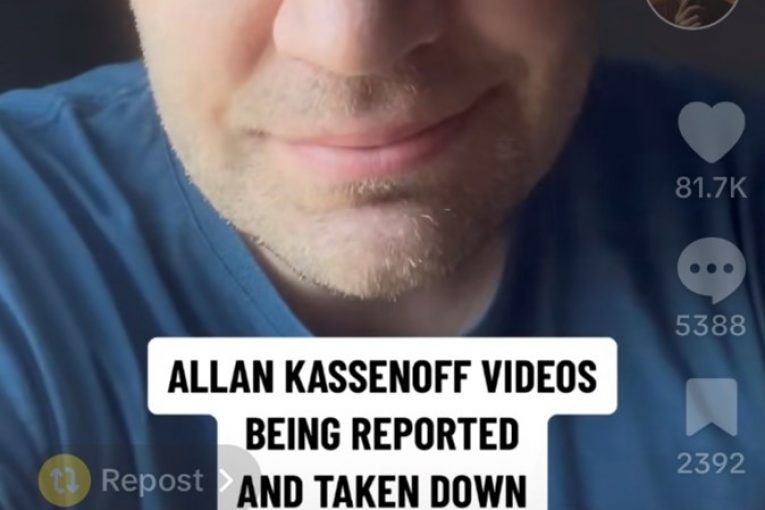
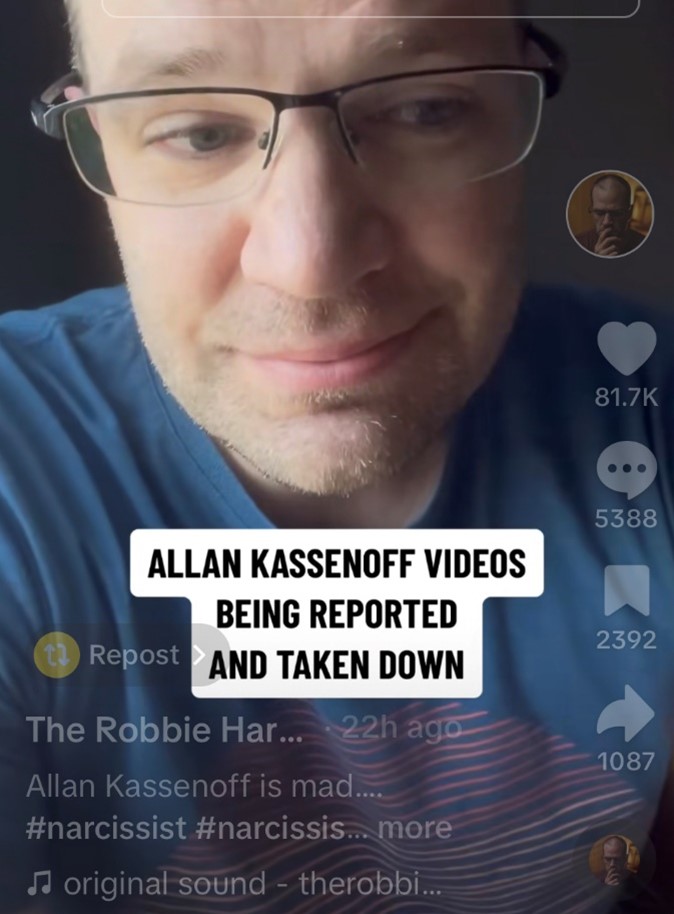
Editor’s Note: The Kassenoff Effect is part of the Vanguard’s expanded family court coverage. This series seeks to report on issues impacting families in New York and California and offers spinoff reporting of the Vanguard’s Tainted Trials, Tarnished Headlines, Stolen Justice series.
June 15, 2023
By Susan Bassi and Fred Johnson
Catherine Kassenoff’s publicized struggles and the controversy surrounding the family court system have generated widespread attention and discussion. In her Facebook posts during the Memorial Day holiday weekend, Catherine revealed the emotional toll of her divorce, including the loss of her children, a restraining order, a malicious prosecution and conflicts of interest that made her feel like an outsider in her own personal divorce proceedings. Her story resonated with other parents who have experienced similar issues within the modern family court system.
These revelations caught the attention of freelance reporters and TikTok influencer Robbie Harvey, who helped amplify Catherine’s message. Harvey’s videos garnered over 30 million views in just two weeks, shedding light on Catherine’s former husband,  attorney Allan Kassenoff, and his professional network within the law firm Greenberg Traurig, where he was a shareholder.
attorney Allan Kassenoff, and his professional network within the law firm Greenberg Traurig, where he was a shareholder.
Five days after Catherine’s initial Facebook post and Harvey’s viral TikTok videos, Greenberg Traurig announced that Allan would be taking a leave of absence, and the firm initiated an internal investigation. Harvey continued to investigate the legal connections between Allan Kassenoff, Greenberg Traurig, and clients represented by Kassenoff, including Samsung. Ultimately, Harvey reported that Allan was scheduled to give a presentation on human resources and that Samsung Denmark was distancing itself from Allan, who had previously represented the corporation in various legal matters.
The day following Harvey’s report on Samsung, and two weeks after Catherine’s initial post, Greenberg Traurig announced on Facebook that Allan had officially resigned, and the firm had established a trust account for the Kassenoff children. The employees were given the option to voluntarily contribute to the fund as a gesture of support.
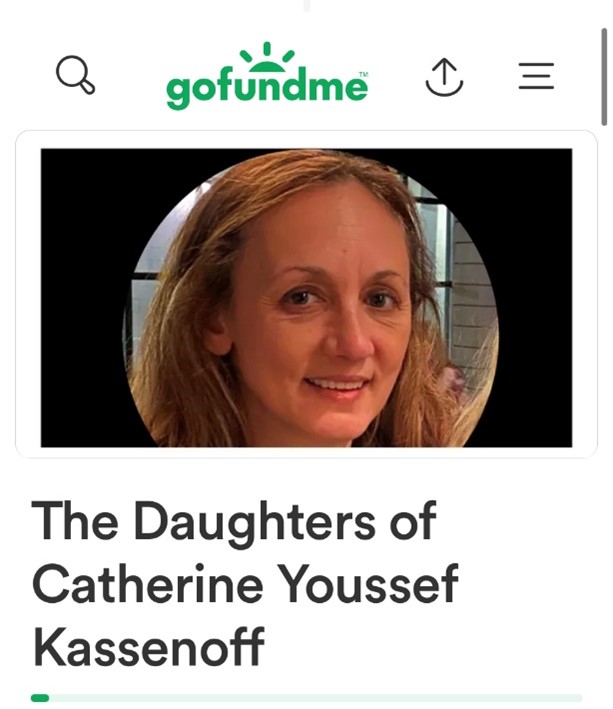
During that same time, Catherine’s longtime friend and former colleague at the Department of Justice (DOJ), Cynthia Monaco, created a GoFundMe account to raise funds in Catherine’s memory and leave a legacy for her daughters. However, after two days, the GoFundMe had received less than $5000 in donations, and it appeared that none of the contributions came from Greenberg Traurig lawyers, staff, or clients.
In the midst of increasing social media pressure on the family court system, Robbie Harvey’s TikTok videos were mysteriously taken down the day after Catherine’s GoFundMe campaign was launched. These raised suspicions of a possible counter social media attack by individuals with vested interests in the family court enterprise.
During the two weeks that Catherine’s Facebook videos circulated on social media, mainstream publications including Ms. Magazine, Daily Mail, and New York Post expanded their coverage of her story. The increased attention was primarily due to the viral TikTok videos created by Robbie Harvey. However, the assault on Harvey’s social media platform resulted in a surge of conspiracy theories, retaliation, and the practice of blacklisting and shadow banning information related to family court.
Family court cases, like the Kassenoff divorce case, often go unnoticed by mainstream media, making the sudden attention to Catherine’s story welcomed by her social media network, which connects people impacted by family court worldwide. It is essential to recognize that the impact of family court extends beyond women, affecting hundreds of thousands of individuals, including men and especially children. The family court system operates with limited government oversight, accountability, and mainstream media attention.

At the core of the Kassenoff divorce case was Carol Most, an attorney appointed by a family court judge to act in the best interests of the Kassenoff children. Shockingly, Most billed $270,000 for her services, with a judge reportedly determining that $100,000 of those charges were improper. Despite this finding, no investigation into Most’s billing practices appears to have taken place. Instead, the courts and other court-appointed professionals attacked Catherine’s mental health and accused her of parental alienation.
The term “parental alienation” has increasingly been used by lawyers to justify excessive court appointments, exorbitant fees, and prolonged family court litigation. In the Kassenoff case, it was used to discredit Catherine as a parent and undermine her credibility, even more so than evidence of actual child abuse and domestic violence she alleged against her former husband, a prominent New York attorney.
One mainstream reporter who has done compelling work on the controversial subjects of parental alienation therapy, reunification therapy and the junk science of parental alienation is Olivia Gentile at Insider.
The “Minor’s Counsel” Controversy and Parental Alienation
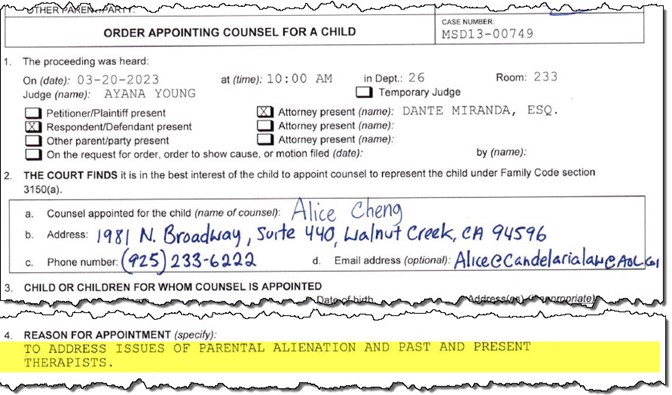
Those unfamiliar with family court may not be aware that, in a divorce or child custody case, a separate lawyer can be appointed by a judge to represent the child or children of the divorcing parents. The practice of appointing “minor’s counsel” is controversial for a number of reasons, including the fact that minor’s counsels have been known to use questionable tactics to drag out a divorce or custody case in order to run up outrageous attorneys’ fees and costs. Further, when a judge appoints lawyers to represent children, it is done by telling the parents the attorney, not them, will act in the “best interests” of the children, an overly broad and ambiguous statement that parents have difficulty understanding as a matter of law during their personal legal proceedings.
One common, unethical tactic used by minor’s counsel to delay a case while inflating, or padding, their bills, is to claim one parent is engaged in parental alienation, or brainwashing a child in a manner that creates emotional distance from the other parent, effectively interfering with the other parent’s relationship with the child. This allegation is typically seen as discrediting to the parent at which it is directed to than a parent accused of abuse, fraud or intimate partner violence. In many family court cases a disconnect appears to arise when a party alleging essentially criminal conduct of a former spouse raises the issue in family court, which is a court of equity, not a court having authority, or jurisdiction, over criminal allegations.
The Vanguard recently obtained records from the Santa Clara Superior Court that shed light on how minor’s counsel, like Carol Most, are compensated in California’s family court proceedings. The soon to be published Tainted Trials, Tarnished Headlines, Stolen Justice series on minor’s counsel reveals the payment structures and practices within the system that are largely unknown, even to attorneys working in the system.
In a recent family law case in Contra Costa County, Judge Ayana Young appointed Alice Cheng, of the Candelaria law firm, as minor’s counsel, even though the mother was represented by an attorney, Dante Miranda, and the father was self-represented, similar to Catherine Kassenoff’s situation. Cheng’s appointment order indicated her role was to investigate parental alienation involving a nearly 17-year-old child who would age out of the family court system in just over a year, rendering minor’s counsel ineffective.
The Vanguard also discovered that Cheng had a practice of requesting a retainer of $7500 in cases where she was appointed to represent children, despite appointed minor’s counsel not being entitled to request retainers. Court appointed attorneys are typically paid only after they file an application and submit their bills to be approved by the court.
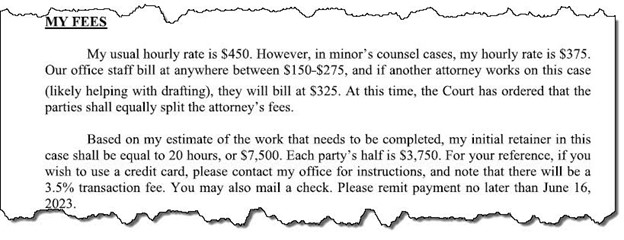
When questioned about her practices, Cheng’s office manager, Maria, stated that they would not ask for a retainer in a case where Cheng was appointed as minor’s counsel by a judge. However, a letter from Cheng’s office obtained by the Vanguard shows her request for a retainer from parents ordered to pay her fees. Despite multiple requests for comment, Cheng did not respond to the Vanguard. Nor did the mother’s attorney Dante Miranda or Judge Ayana Young.
In Santa Clara County, recently acquired records reveal payments made by parents and taxpayers to minor’s counsel. When parents are unable to afford an attorney to represent their children in divorce proceedings, taxpayers cover the costs at a deeply discounted rate, a rate that is not provided to parents who privately pay for the same legal services.
Therefore, private payment becomes more attractive to lawyers due to the alleged favoritism and cronyism involved in the appointments by judges. When a judge determines that parents can afford to pay for minor’s counsel, the appointed attorney bills at their full rate, ranging from $350 to $650 per hour. However, when taxpayers pay the bills, the rates are typically reduced to $100 per hour in Santa Clara.
In the Kassenoff case, the judge approved payment to Carol Most, despite acknowledging that she had overbilled the Kassenoffs by a reported $100,000. Surprisingly, no criminal charges were filed in response to this overbilling, raising concerns about the management and supervision of minor’s counsel and the exorbitant charges imposed on parents during their personal divorce cases.
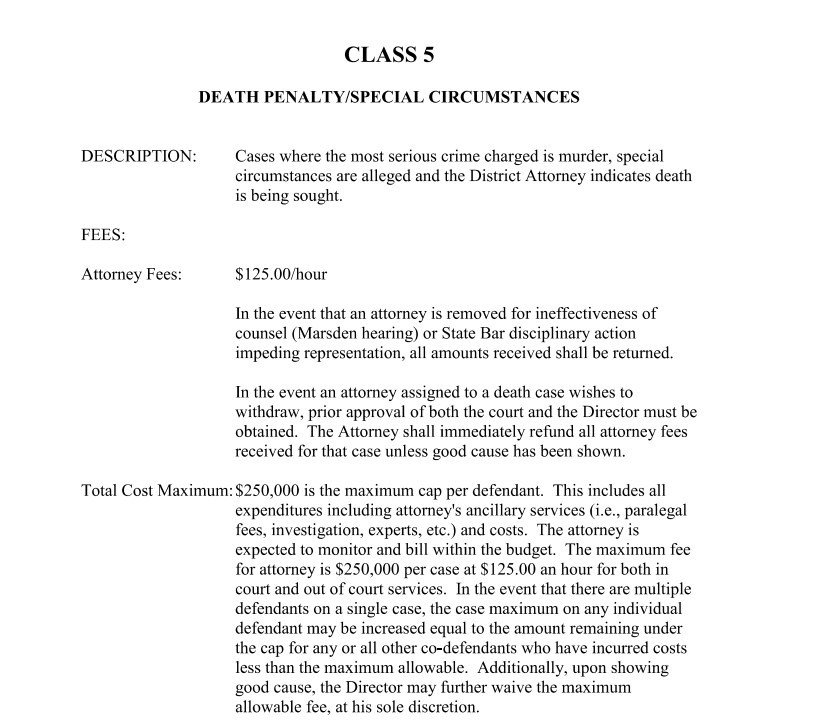
In criminal court, defendants have a constitutional right to appointed counsel, and if they cannot afford a lawyer, taxpayers cover their defense costs. However, these payments have limits. In Santa Clara County, the government limits payments for felony divorce cases to $250,000, which is $20,000 less than what Carol Most charged in the Kassenoff case.
As public outrage continues to grow, and more individuals come forward to share their experiences, the future of the Kassenoff divorce case may serve as a catalyst for much-needed reform within the family court system. What is clear from the online social media footprint pertaining to family court is the systemic issues extend beyond gender, impacting men, women, and children alike.
Please support Vanguard’s expanding coverage of California’s family courts. Tax deductible donations earmarked for this reporting can be sent via Pay Pal or directly to the Vanguard.

Catherine Kassenoffs’ Facebook Posts https://drive.google.com/file/d/1HvlfGz0tPTjeB3uSQZ1yR6H3pWL5iuph/view?usp=sharing